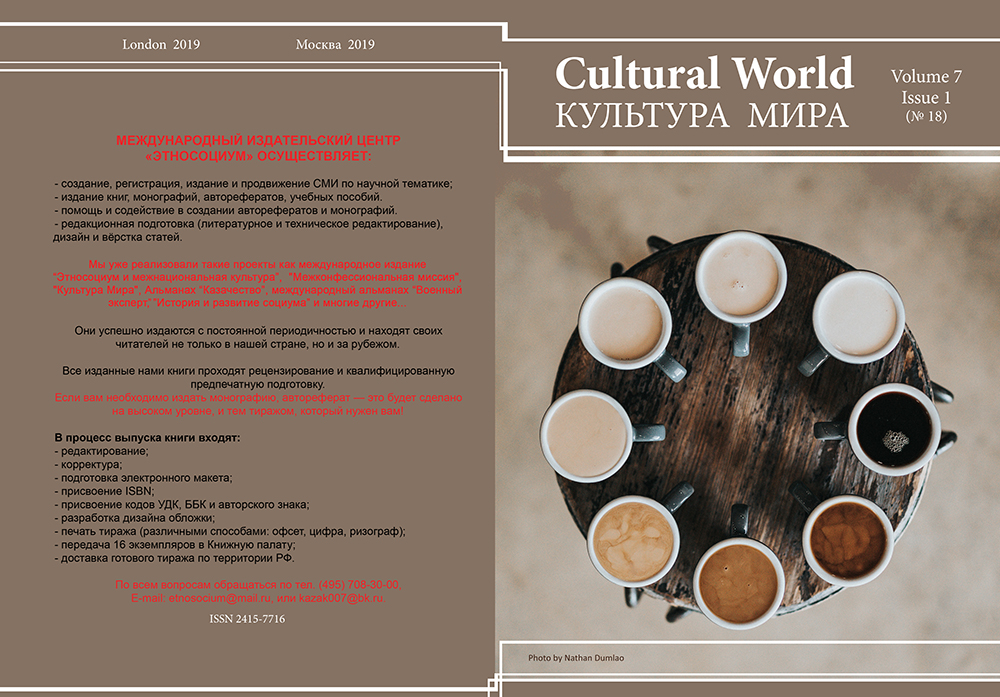
Volume 7. Issue 1. (№ 18)
The Council of Reviewers of the publishing house together with the teaching staff of leading universities:
The main criteria of our choosing materials for publishing is their high scientific level. The main principle of the publishing house is to accept pluralism of views if authors present their points of view in a well-argued manner. The author’s view point does not have to coincide with the editors’ view points.
The authors of submitted materials are responsible for the accuracy of facts, quotations, dates, events, geographical and proper names.
If you use any materials from the journal, you are to give a relevant reference to it.
All the submitted materials are reviewed.
Contents
|
Geopolitics, human rights
|
|
|
Zemanek Ladislav The Rise of Eurasia: Shaping the New Eurasian Paradigm
|
10
|
|
Tangatarova Nigora Foreign policy of sovereign Uzbekistan: basic principles and changes after 2016th
|
20
|
|
Biryukov S.V. Development issues of Siberia: does the “big region” have perspectives?
|
34
|
|
UNESCO: culture and national traditions
|
|
|
Monuments of history and architecture of federal significance
|
70
|
|
Social projects and information technologies
|
|
| Murashko S.F., Rudakova S.V. Educational autonomy of students | 79 |
| Galaganova S.G. «Recalling future»: mythological sense-building for XXI century | 85 |
| Festival of national cultures | 98 |
|
Press release
|
|
|
Vincenzo Trani Elected President of the Italian-Russian Chamber of Commerce
|
100
|
|
Abstracts
|
103
|
|
Authors
|
107
|
Abstracts
Zemanek Ladislav
The Rise of Eurasia: Shaping the New Eurasian Paradigm
The study presents a brief comparative view on the main Eurasian integration projects – Shanghai Cooperation Organisation, Eurasian Economic Union, Greater Eurasia and the Belt and Road Initiative, focusing on their normativity, principles and goals. On the basis of such a comparison, a new paradigm of the international order called the New Eurasian Paradigm (NEP) is formulated. The article introduces a specific Eurasian attitude towards cooperation and integration and shows that there are no fundamental ideological contradictions among the Eurasian integration projects chosen but, at the same time, their successful development requires political will, close cooperation, mutual recognition and understanding and also a change of thinking, an identity reinterpretation and acceptance of Eurasia-orientated perspective and partnership.
Key words: Eurasia, Shanghai Cooperation Organisation, Eurasian Economic Union, Greater Eurasia, Belt and Road Initiative, China, Russia, integration, New Eurasian Paradigm.
Tangatarova Nigora
Foreign policy of sovereign Uzbekistan: basic principles and changes after 2016th
The foreign policy shift realized by Shavkat Mirziyoyev caused unprecedented attention around Uzbekistan among the international community. In his two years of presidency Mirziyoyev has been able to transform the relations with all the neighbors, make input in settlement of Afghanistan problem, and enhance cooperation with global powers: Russia, China, and the US. Actual topic of Uzbekistan’s foreign policy has been around the new foreign policy concept. The current and the first ever concept paper in the sphere of foreign policy was adopted on 1 August, 2012 – and delivered two major points: the military neutrality and Central Asia as a priority region of Uzbekistan’s foreign policy.
Key words: Uzbekistan, foreign policy, international community, strategy, military neutrality, Central Asia.
Biryukov S.V.
Development issues of Siberia: does the “big region” have perspectives?
The article discusses possible alternative development strategies that could form the basis of a fundamentally new regional policy of Russia. The author addresses this issue in the context of a mega-project on the creation of State Corporation for the Development of Siberia and the Far East claimed recently by the federal authorities. The author analyzes this project in terms of its ability to provide the progressive development of the regions of Siberia and the Far East, ensure flexible alignment of federal and regional interests.
Key words: Siberia, the Far East, regionalism, regional strategy, regional development, regional policy, State Corporation, technocracy, centralism.
Murashko S.F.
Rudakova S.V.
Educational autonomy of students
The authors of the article consider topical issues of students' preparation for classes, planning and organization of independent work of a student in the process of education and performance of research works made by students, preparing them for independent solution of professional tasks.
Key words: modern communicative and educational needs, autonomous activity of the student, educational autonomy, individualization of education, information, computer, remote, practice-oriented, scientific and methodical technologies.
Galaganova S.G.
«Recalling future»: mythological sense-building for XXI century
Mythological sensebuilding is appreciated here as a smart mindbuilding technology, aimed at world culture renewal, which is urgent for human survival. The image of Daedalus, the famous mythical engineer and aeronaut, is argued to be an ideal pattern of a daring and creative human being, while Ancient Greek culture is treated as a source of basic existential senses. The latter are comprehended as a possible foundation for a universal goal myth, vital for planetary future.
Key words: myth, mythology, goal myth, sensebuilding, mythological sensebuilding, culture, Alton Wiener, «Magnificent Myth», Milana Aldarova, «Daedalus. Oratorio».
Authors
Biryukov S.V., Doctor of Political Sciences, Professor, School of advanced international and area studies at the East China Normal University (ECNU) (Shanghai, China).
Galaganova S.G., Candidate of Philosophical Sciences, Associate Professor of the Bauman Moscow State Technical University, Department of Information Analysis and Political Technologies.
Murashko S.F., Professor of the Moscow Academy of the Investigative Committee of the Russian Federation.
Rudakova S.V., Assistant professor of the Moscow Academy of the Investigative Committee of the Russian Federation.
Tangatarova Nigora, School of Advanced International and Area Studies of East China Normal University, Shanghai, China.
Zemanek Ladislav, Doctor of Philosophy, Institute of Global History, Faculty of Arts, Charles University (Prague, Czech Republic).

